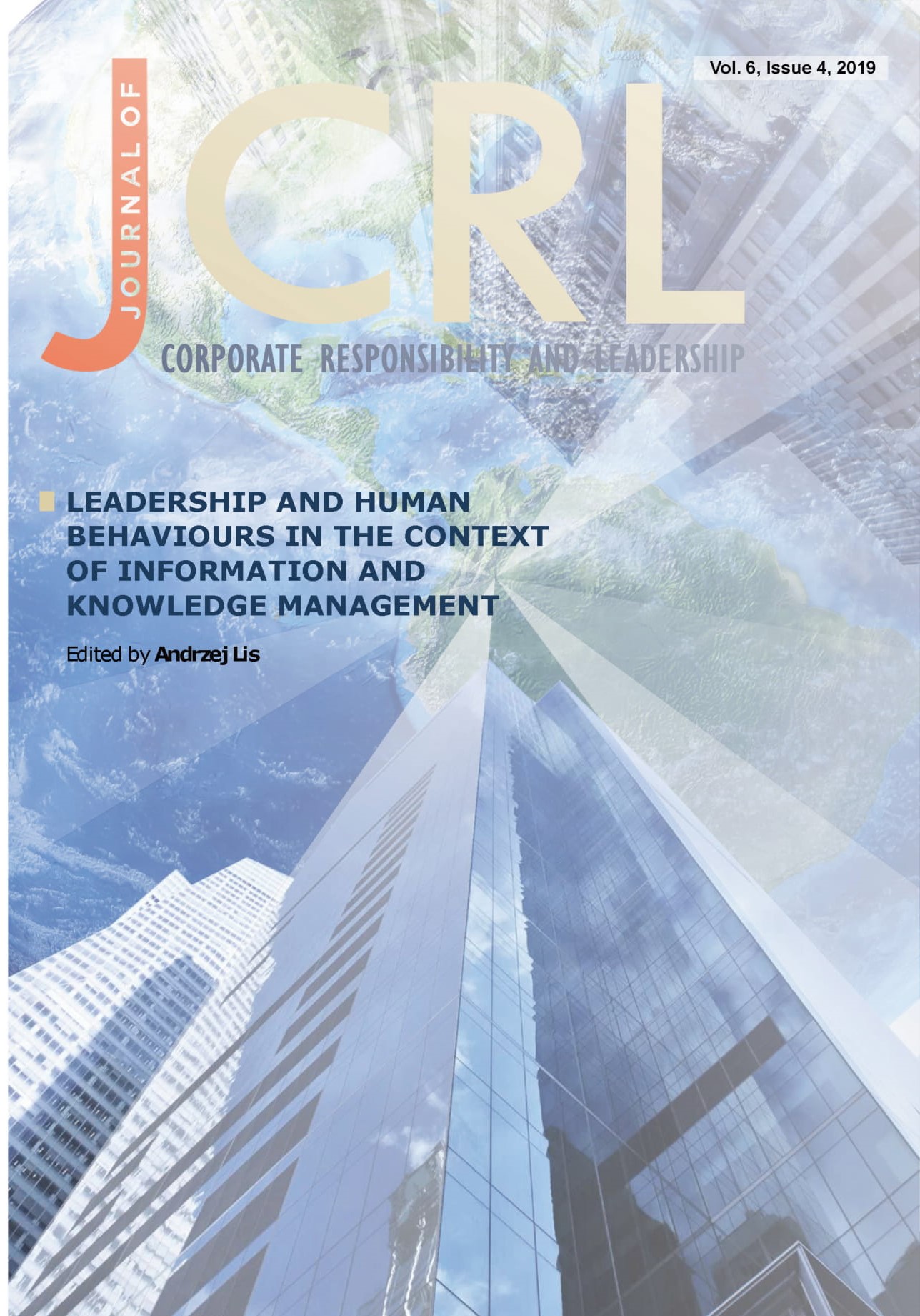The Key Knowledge Workers in the Process of Sharing Knowledge: Motives and Conditions
DOI:
https://doi.org/10.12775/JCRL.2019.015Keywords
key knowledge workers, knowledge sharing, knowledge sharing motives, knowledge sharing conditionsAbstract
Purpose: The purpose of the study is to identify motives and conditions acting as incentives for key knowledge workers to share their individual knowledge with other employees.
Methodology: The interviews with key knowledge workers of 50 companies operating in Poland were employed as the main data collection method. In the process of analysis, the interview findings were compared with the results of the questionnaire survey conducted among entrepreneurs and managers representing the companies of the interviewed key knowledge workers. Findings: The motives of knowledge sharing by key knowledge workers are as follows: financial motivation, sense of responsibility for the results of the organization and the results of teamwork, building and consolidating professional authority. The following conditions
are required to be established to support knowledge sharing by key knowledge workers: organic leadership, organization of team work, communication processes, HR processes.
Practical implications: Achieving high results in knowledge sharing with the participation of key knowledge workers requires a comprehensive knowledge management system. The knowledge-oriented enterprises have to create the adequate working environment for the key knowledge
workers. The comfort zone for such employees guarantees that they become aware investors of their own intellectual capital. Their engagement in the knowledge sharing process is the key issue in regard to achieving the long-term, sustainable competitive advantage. Originality/value: The originality of the study derives from the fact that the issue of motives and conditions for key knowledge workers to share their knowledge has not been much studied, especially in the context of the companies operating in Poland. Comparing and contrasting the opinions of the interviewed key knowledge workers with the point of view represented by the entrepreneurs and managers of their companies provides additional value. Paper type: Research paper.
References
Abbasi, S. M., Belhadjali, M., & Hollman, K. W., (2009). Managing knowledge workers for sustaining competitive advantage. Competition Forum, 7(2), 367–370.
Adelstein, J. (2007). Disconnecting knowledge from the knower: The knowledge worker as Icarus. Equal Opportunities International, 26(8), 853–871.
Alawi, A. I., Al-Marzooqi, N. Y., & Mohammed, Y. F. (2007). Organizational culture and knowledge sharing: Critical success factors. Journal of Knowledge Management, 11(2), 22–42.
Cabrera, A., & Cabrera, E. F. (2002). Knowledge-sharing dilemmas. Organization Studies, 23(5), 687–710.
Calantone, R. J., Cavusgil, S. T. & Zhao, Y. (2002). Learning orientation, firm innovation capability, and firm performance. Industrial Marketing Management,
(6), 515–524.
Chua, A. L. & Pan, S. L. (2008). Knowledge transfer and organizational learning in IS offshore outsourcing. Omega – International Journal of Management Science,
(2), 267–281.
Dalkir, K., (2005). Knowledge Management in Theory and Practice. Jordan Hill, Oxford: Elsevier Inc.
Davenport, T. (2005). Thinking for Living. HVB School Publishing.
Gupta, K. S. (2008). A comparative analysis of knowledge sharing climate. Knowledge
and Process Management, 15(3), 186–195.
Hislop, D. (2003). Linking human resource management and knowledge management via commitment: A review and research agenda. Employee Relations, 25(2),
–202.
Horwitz, F., Heng, C. T., & Quazi, H. A. (2008). Finders keepers? Attracting, motivating and retaining knowledge workers. Human Resource Management Journal, 13(4), 23–44.
Huang, T. (2011). Comparing motivating work characteristics, job satisfaction, and turnover intention of knowledge workers and blue-collar workers, and testing a structural model of the variables’ relationships in China and Japan. The International Journal of Human Resource Management, 22(4), 924–944.
Jashapara, A. (2004), Knowledge Management: An Integrated Approach. Harlow: Prentice Hall.
Lin, H-F, Lee, G-G. (2004). Perceptions of senior managers toward knowledge-sharing behavior. Management Decision, 42(1), 108–125.
Lowe, G.S. (2002). Leveraging the skills of knowledge workers. Isuma, Spring, 79–86.
Manaf H. A., Armstrong S., & Lawton A. (2011). Knowledge sharing practices, managerial tacit knowledge, and individual performance: Their interrelationships and the moderating role of employee personality. In Lehner F., & Bredl, K. (Eds.), Proceedings of the 12th European Conference on Knowledge Management (pp. 551–562). University of Passau, Germany 1–2 September 2011.
Mladkova, L. (2013). Knowledge worker from the perspective of their manager. In Janiunaite, B. & Petraite, M. (Eds.), Proceedings of the 14th European Conference on Knowledge Management. Kaunas University of Technology, Lithuania 5–6 September 2013.
Mooradian, T. A., Renzl, B. & Matzler, K. (2006). Who trusts? Personality, trust and knowledge sharing. Management Learning, 37(4), 523–540.
Morawski, M. (2014). Polish national knowledge management styles: Studies in selected companies representing creative industries. In Vivas, C., & Sequeira, P. (Eds.), Proceedings of the 15th European Conference on Knowledge Management (pp. 708–715). Polytechnic Institute of Santarem, Portugal, 4–5 September 2014.
Morawski, M., & Szałko B. (2015). The process of creativity in the light of the research based on the ‘Icedip’ model in the selected organizations of creative industries. In Nalepka, A., & Ujwary-Gil, A. (Eds.), Business and Nonprofit Organizations Facing Increased Competition and Growing Customers’ Demands (pp. 53–66). Nowy Sącz: Wyższa Szkoła Biznesu – National-Louis University.
Morawski, M. (2016). How to manage knowledge workers in creative industries: Evidence from Poland. In Proceedings of the 17th European Conference on
Knowledge Management (pp. 639–649). Belfast: Ulster University.
Morawski, M. (2017). Pracownik kluczowy w procesie dzielenia się wiedzą: Motywy, warunki, metody (in English: A Key Worker in the Process of Sharing
Knowledge: Motives, Conditions, Methods). Wrocław: Wydawnictwo Uniwersytetu Ekonomicznego we Wrocławiu.
Morawski, M., Piepiora, Z., & Rogala, P. (2017). Model of enterprise management in the creative industries on the basis of empirical research. Review of Business
Research, 17(1), pp. 61–66.
Morawski, M. (2018). Jak zarządzać pracownikami wiedzy? Czy znajdziemy na to dobre odpowiedzi? In Gierszewska, G. (Ed.), Co dalej z zarządzaniem? (pp. 138–151). Warszawa: Oficyna Wydawnicza Politechniki Warszawskiej.
Pietruszka-Ortyl, A. (2011). Komunikacyjne aspekty organizacji pracy pracowników wiedzy. In Potocki, A. (Ed.), Komunikacja w procesach zarządzania wiedzą
(pp. 77–97). Kraków: Fundacja Uniwersytetu Ekonomicznego w Krakowie.
Wiig, K., de Hoog, R., & van der Spek, R. (1997). Supporting knowledge management: A selection of methods and techniques. Expert Systems With Applications, 13(1), 15–27.
Downloads
Published
How to Cite
Issue
Section
Stats
Number of views and downloads: 514
Number of citations: 0



